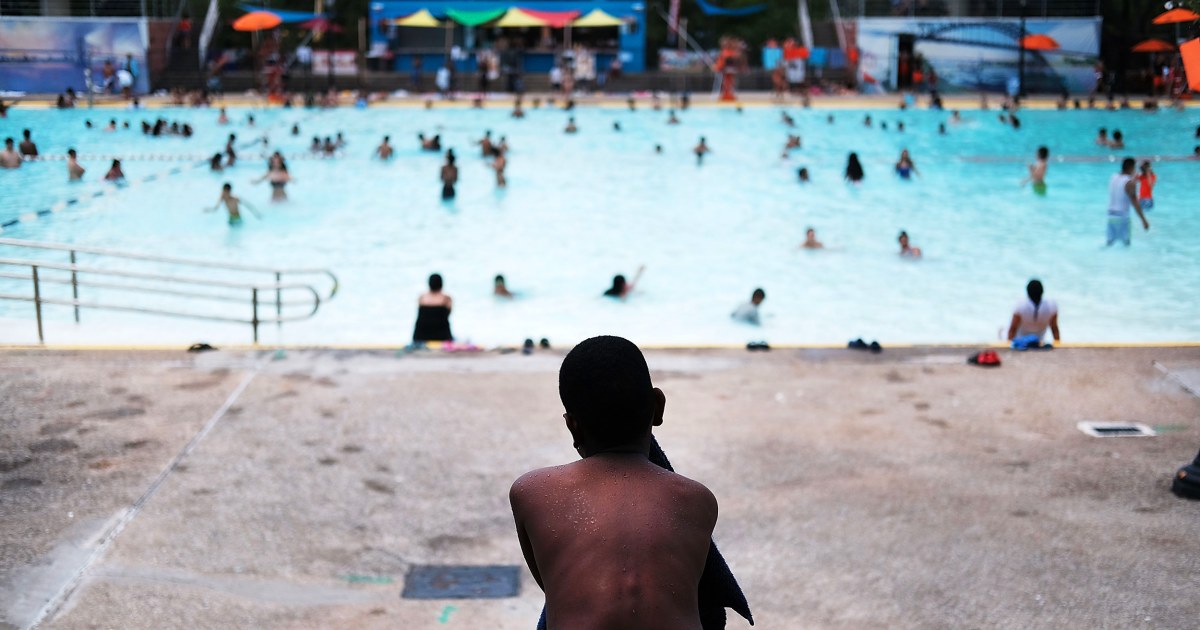
Two years ago, Paulana Lamonier, 30, tweeted about wanting to teach 30 Black people to swim that summer.
"My goal is to teach 30 black people how to swim this summer and I'm trying to come up with a hashtag for this campaign. feedback is welcome," she wrote.
“It went viral,” Lamonier said. “From that moment, I realized that people really want swim lessons.”
What began as a simple goal sparked a dialogue about the racial disparities and stereotypes in swimming.
“One of the clients that I was teaching privately told me she couldn’t swim because her bones were too dense, and I thought if she thinks that, how many other Black people believe that false and racist narrative as their truth?” Lamonier said.
Last March, she created Black People Will Swim to provide swimming education to Black families and eradicate the idea that Black people simply don’t swim. The organization's goal is to teach more than 2,000 people over the coming years about of swimming through low-cost swimming courses for children and adults in New York.
As lessons were about to launch, however, the pandemic closed nearly everything.
While in isolation, she decided to make pitches to grants and foundations to fund essential expenses such as instructors and pool rentals.
Black People Will Swim has an online pledge available to sign in order to bring awareness and help others remain accountable on their swim journey. Lamonier said the message of Black People Will Swim lies in the acronym, F.A.C.E — Fun, Awareness, Community, Education.
“We’re making it fun,” she said. "We’re building awareness because we want to make sure people are aware that it’s not their fault. For community, we have a class where you can bring a friend or cousin called 'Go Best Friend' class."
The education portion ranges from understanding the purpose behind Black People Will Swim to even learning how to properly wear a swim cap over natural hair.
A study conducted by the USA Swimming Foundation and the University of Memphis found that 64 percent of Black children have little to no swimming ability. Overall, the Black drowning rate was about 40 percent higher than the rate for white people.
Lack of awareness stems from a lengthy history of racism as segregation kept Black people out of swimming pools that were located in wealthier, white neighborhoods. Today, many pools remain in predominantly white communities and not in Black neighborhoods, leaving Black families at a disadvantage. Lessons or pool membership fees can also be cost prohibitive.
“It’s generational fear too,” Lamonier said. “If your parents don’t know how to swim, your great-grandparents don’t know how to swim, what’s the likelihood of you learning how to swim.”
Lamonier, a freelance journalist, said her swimming journey began with lessons as a young girl. As a first-generation Haitian American, she was encouraged to swim, but eventually lost her skills over time. Years later, a college requirement landed her back in the pool, where she regained her skills well enough to join the university’s swim team.
Exclusion from recreational swimming has also prevented Black swimmers from entering the sport on a competitive level. Anthony Ervin was the first Black swimmer to make the U.S. Olympic swimming team in 2000. Ervin went on to win a gold medal in the men’s 50-meter freestyle. Simone Manuel became the first African American woman to win an individual Olympic gold medal in swimming in 2016.
For many Black competitive swimmers, the lack of representation can be alienating. Though Lamonier has competed on all-Black teams, she understands that swimming in predominantly white spaces is intimidating.
“I receive tons of emails, saying 'Hi, my daughter’s the only Black girl on her swim team,'" she said. “It’s a very isolating experience because let’s say you’re trying to put on your swim cap — no one’s going to understand that experience having to put your braids in the front.”
She has been a swim instructor and a certified lifeguard for nine years. Some other objectives of Black People Will Swim include certifying more Black instructors and developing a swim cap more suited to accommodate different Black hair types. The organization believes in creating a more inclusive environment for more Black people to step in the water.
Black People Will Swim will begin a variety of classes July 30. Aside from the launch, the company is working to create a social media campaign, #MySwimStory, in which Black people can share their stories and experiences.
Pools are largely owned by the government or nonprofit organizations. Lamonier plans to build one of the first Black-owned pools in a major city in the U.S. with the help of all the fundraising she's accomplished over the last year.
In 2020, Black People Will Swim received a grant from Adidas x IFundWomen and Lamonier was a semi-finalist for the Pine-Sol and Essence Build Your Legacy Contest. She recently won $30,000 through a pitch competition for Ally Financial's Daring to Disrupt.
“With the funding, I’m able to certify myself and my team and get swimming insurance, but most importantly we are working toward getting a pool,” she said.
Though Black People Will Swim is based in New York, Lamonier aims to expand across the U.S. with different chapters so Black families can feel safe in knowing their children can swim, while also ensuring more Black people get into aquatic sports.
“For now, we’re starting small,” she said. “But we intend to keep the mission going and give opportunities so that Black people can learn how to swim, and see if you can run a business of Black-owned business in a predominantly white sport.”
Follow NBCBLK on Facebook, Twitter and Instagram.
"company" - Google News
July 27, 2021 at 05:15PM
https://ift.tt/3iLr5W8
This company is trying to end a prevalent racial disparity - NBC News
"company" - Google News
https://ift.tt/33ZInFA
https://ift.tt/3fk35XJ
Bagikan Berita Ini















0 Response to "This company is trying to end a prevalent racial disparity - NBC News"
Post a Comment